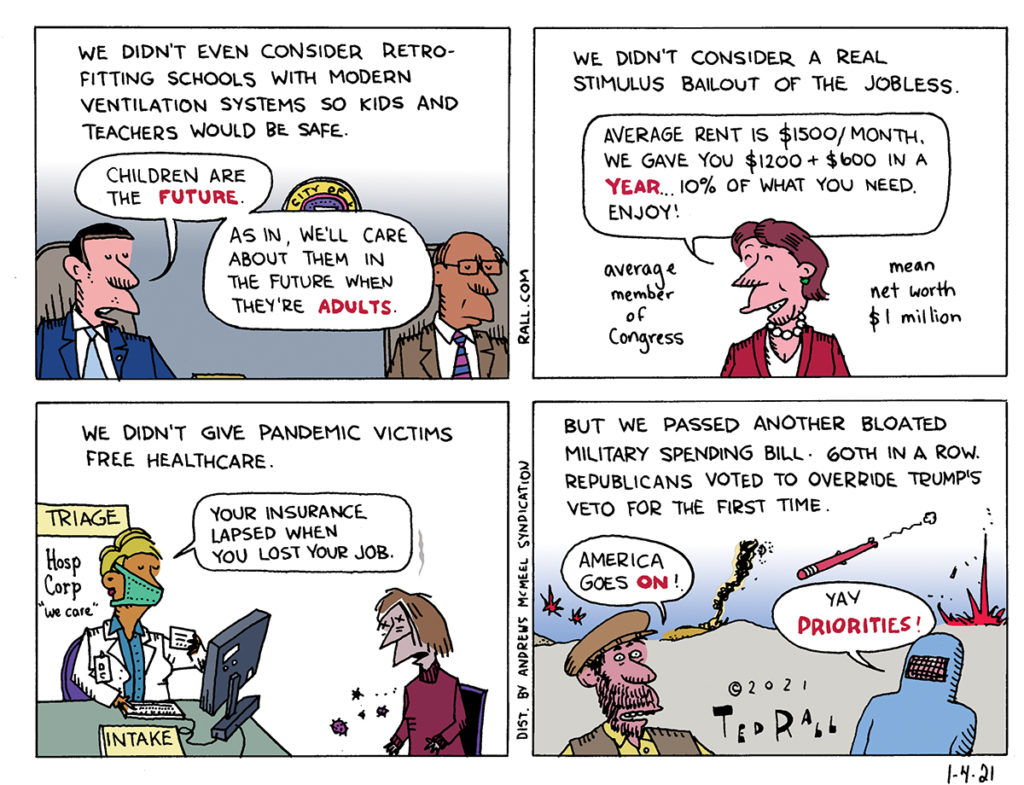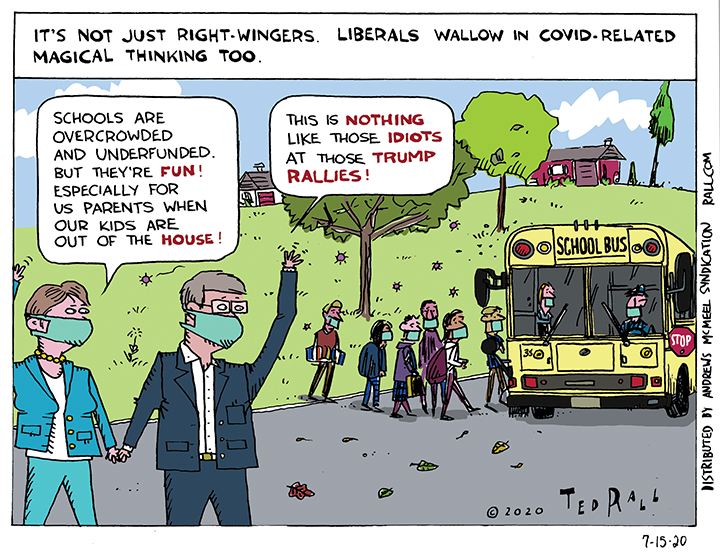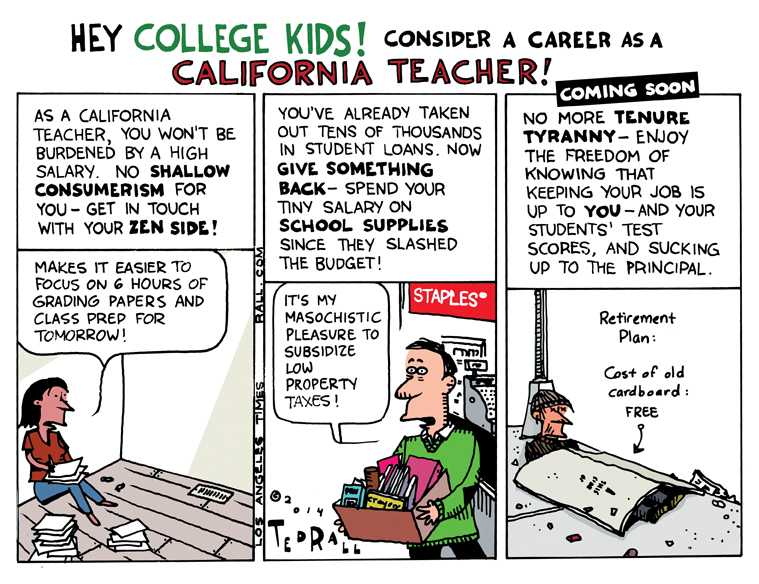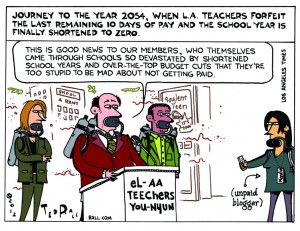A frequent talking points that Israel is their complaint that Hamas uses civilians as human shields. Of course, this ignores the fact that it’s difficult to build infrastructure away from civilians in a densely-populated urban environment like the Gaza Strip.
What’s the Difference between a Trump Rally and a Public School?
Liberals like to make fun of ignorant conservatives for ignoring basic health protocols during the COVID-19 crisis like wearing masks and attending mass gatherings. But they have their blind spots as well. They want K-12 education as well as colleges to open up this fall even though there’s no reason to believe that they would be able to enforce social distancing.
SYNDICATED COLUMN: Austin Beutner: L.A.’s Creepy New School Superintendent Keeps Failing Up, Leaving Destruction in His Wake
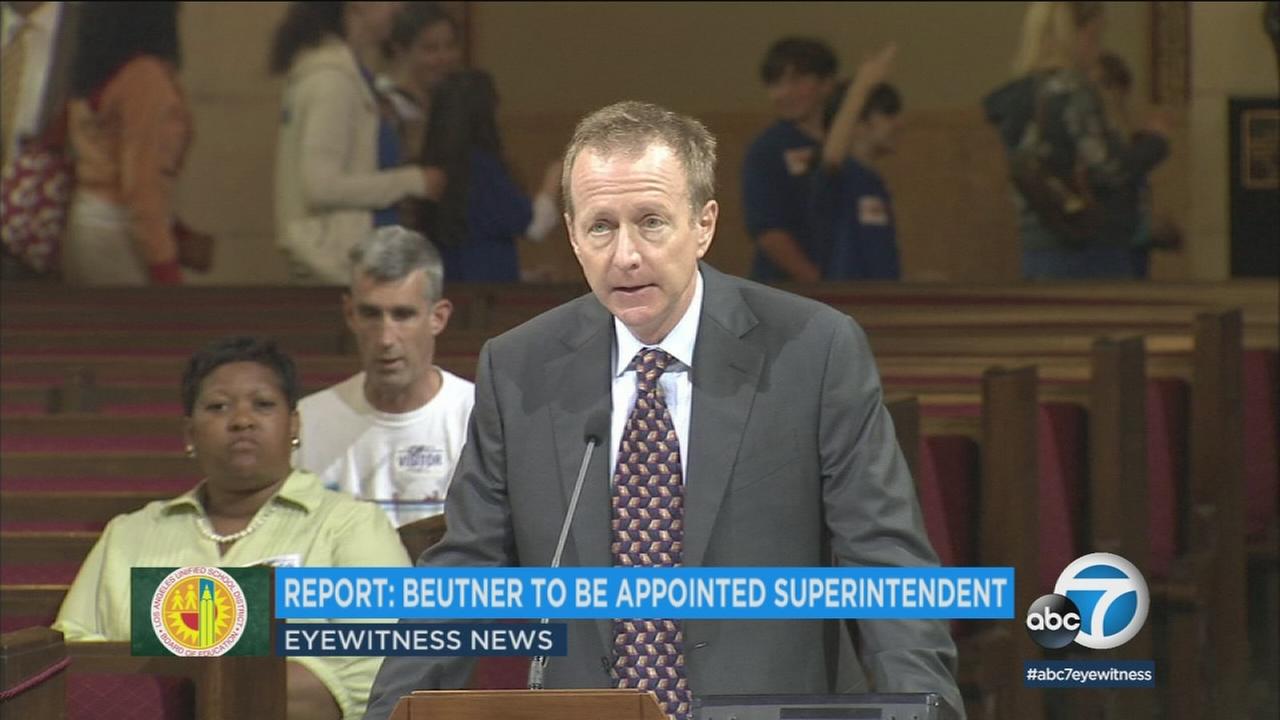
The Los Angeles Unified School District faces big problems. Magnet schools and second language programs have failed to slow declining enrollment; each of the 12,000 kids who pulls out this year means less state funding. The sprawling bureaucracy seems unable or unwilling to respond to chronic bullying centered in the elementary schools. L.A. United is in the peculiar position of raising its budget — most recently to $7.5 billion — while still having to cut back support personnel.
L.A. Unified requires strong, decisive leadership by an education expert in it for the long haul. The last thing the district and its 640,000 students need is a narcissist dilettante with one agenda: prettying up his resume. But that’s what it’s getting in the form of Austin Buetner.
The shadowy 58-year-old hedge fund billionaire and philanthropist, a self-declared political nonpartisan (but Bill Clinton ally) who began accruing his fortune making shady investments amid the ashes of the collapsed Soviet Union under Boris Yeltsin and co-founded the shady boutique investment and consulting company Evercore Partners, recently got the nod from the school board to take charge of L.A. United’s nearly one thousand schools as superintendent. Scratch the thin surface of Beutner’s resume, however, and what you find is a Hillary Clinton-like predilection for failing upward.
“Cynics might look at Beutner’s conquest of Los Angeles — the fastest takeover of a major global city since the Visigoths sacked Rome — and suggest that Southern California’s institutions must be awfully weak to keep seeking the services of the same finance guy,” Joe Mathews sardonically observed in The San Francisco Chronicle. “They might question why he keeps getting jobs while only staying in previous ones for a short time (a year or so) and without producing a record of sustained success.”
Beutner’s first major foray into public service was as deputy mayor, but he only lasted a year at City Hall. He quit to run for mayor, but gave that up when it became clear that his candidacy had fewer takers than New Coke.
In 2014 Beutner, who had no journalistic experience and as far as we know has never even delivered a newspaper, was named publisher of The Los Angeles Times, following more than a decade of brutal budget cuts, declining circulation and diminishing relevancy. No one but the man himself knows why he wanted the job; Southland political observers theorized that he wanted to leverage the editorial page to run for mayor again or perhaps for California governor. To be fair, no one man could have fixed what ailed the Times after its long gutting — but if such a miraculous creature existed, it wasn’t Austin Beutner.
The problem as always for Beutner is that while he knows how to slap backs and twist arms in the toniest corridors of power, he has no natural political constituency amid the electorate. He “lacks…name recognition,” the Times drily reported during Beutner’s aborted 2011 mayoral run.
Disclosure: Violating journalism’s traditional wall between the editorial and business sides of the operation, Beutner fired me as the newspaper’s editorial cartoonist as a favor to his biggest political ally, LAPD Chief Charlie Beck, because I had made fun of the cops. Overeager to please the fuzz, he even published a pair of articles about me that pretty much defined the word libel. I’m suing him and the Times for defamation and wrongful termination.
Beutner’s dealings with the LAPD, whose pension fund purchased substantial shares of the Times’ parent company during the short Beutner era, may be one of many moving parts of what school board member Scott Schmerelson, who voted against Beutner for the superintendent post, was referencing when he complained that the board majority failed “to exercise due diligence regarding Mr. Beutner’s lengthy and tangled business affairs.” Quoting Schmerelson, the Times lazily allowed: “Schmerelson did not cite an example, but Beutner, who is wealthy, has wide-ranging investments and a complex business background.”
To say the least.
Just over a year after taking the helm at Times Mirror Square, Beutner brazenly attempted a failed boardroom coup to seize both the Times and the San Diego Union-Tribune from the clutches of the Chicago-based Tribune Publishing (now known as Tronc). The Tribbies were so appalled that they ordered him unceremoniously removed with his banker’s box full of office supplies, turning off his Times email account so he had to send his farewell via Facebook.
Now this creepy dude is running the schools. Which prompts a few questions.
Beutner is loaded. He doesn’t need the job. Why does he want it? (Although he’s apparently not so much of a billionaire that he turned down the job’s $350,000-a-year paycheck.)
Will he last more than a year this time?
Will there be parent-political blowback from the, to be charitable, less than transparent way that he won the support of the school board over Vivian Ekchian, the incumbent interim superintendent and career educator?
Asked the first question, Beutner responded, as he often does, with a stream of pablum: “It’s about the kids. My own roots, my mom was a teacher, my dad worked very, very hard to make sure that I had a great public education. It’s that common place — it’s the community place, the commonplace, the community connects. And if we can provide students that same opportunity I had with a great public education, what a gift, what an honor to be able to work towards that.”
In other words, who knows what Austin wants? The most obvious answer is that Beutner is a wannabe political animal who recognizes his biggest political problem: no one knows who he is. Being perceived as having turned around the schools might be leveraged into a mayoral or even gubernatorial run. Perhaps he’ll want to connect his business allies to lucrative contracts supplying the district; if so, he would merely be following up such fiascoes as the district’s 2013 plan to issue iPads to every student, which devolved into scandal. Beutner is a proponent of charter schools, but he faces a dilemma there: every student who transfers to a charter school takes away more revenue from the traditional institutions.
The Beutner-aligned Southern California media universe isn’t spilling much ink on the aftermath of the Ekchian snub. But a lot of parents, not to mention women reveling in the #MeToo movement, felt rubbed the wrong way by the appointment of a rich white male educational neophyte over a woman with 32 years of experience working within L.A. Unified, where she began as a teacher assistant.
“The man you’re about to choose has no history of success anywhere,” warned ex-school board president Jeff Horton. “What that says to all of the educators that you depend on to deliver your product is, ‘We don’t really care whether a person knows about education. We have other criteria — which are connected with our donors and our backers.’” The majority in the 5-2 vote received a total of $15 million in donations from the charter lobby.
One thing is certain: even for a miracle worker, it will take a lot longer than Beutner’s usual year-long tenure to demonstrate significant improvement in the district. Times columnist Steve Lopez lists the issues: “Falling enrollment, rising pension and healthcare costs, academic struggles, billions in deferred building maintenance at hundreds of schools, political division on the board and an ongoing philosophical difference between charter school supporters and those who believe they are draining traditional schools staffed by union teachers.”
Here’s the rub: even if Beutner somehow manages to make a dent in L.A. Unified’s longstanding problems, there’s no metric in place to judge success that everyone agrees upon. Knowing Beutner — as you can imagine, I’ve studied him closely — I’d lay better-than-even odds that, as ever in search of a quick score to pump up his political prospects, he’ll throw up his hands and walk away again before long.
(Ted Rall (Twitter: @tedrall), the political cartoonist, columnist and graphic novelist, is the author of “Francis: The People’s Pope.” You can support Ted’s hard-hitting political cartoons and columns and see his work first by sponsoring his work on Patreon.)
Guest Post: “The Wisdom of an American Teacher”
In the 1970s, intense pressure was brought to bear on public schools to include all students in the regular classroom. Mainstreaming changed everything. Today, American schools favor what is called accessibility and inclusion. The current order of things is taken for granted. We are living in the unfortunate, extended afterlife of a dystopian experiment that has deskilled the American classroom. While well-intentioned, mainstreaming students lowered standards for everyone. It has been a change on a tremendous scale. Education is no longer special when these students are put in the regular classroom. It is time to abandon this project.
What is a special education student? It has really come to be an indeterminate term. They are a heterogeneous bunch. We talk about them as though they are one entity, but they come in so many flavors: the dull, the disruptive, and the dumb. What no one wants to acknowledge about them is their abnormality. Perhaps this point is so obvious as to be banal, but genuinely special ed students are ghastly. Sometimes their ghastliness lies in their work; other times, it lies in their personalities.
A very basic yet simple question needs to be asked: what is so special about special education students? The answer: Nothing. Nothing special is either visible or hidden in these students. They are abnormal, irregular misfits. Only the special can be called special. We have become careless about this word, making it interchangeable with the abnormal. We have turned this word into just another well-meaning attempt at democratization. Furthermore, we no longer interrogate the criteria by which we call someone special. When even the ghastly are special, we have become dishonest.
I absolutely know that these students are not special. I learn firsthand about these students every year in the regular classroom. My heart races with distress in late August when I look at my roster and see all the abnormal students shoved in my room. The difficulties with putting them there should be obvious. With their outbursts and temper tantrums, their violations of social norms, they spark crises. Sometimes it is hard to believe that these monsters are the creation of a beautiful God. They are not able to conform socially. They cast a shadow on the ability of everyone else to learn. Their IQs tilt to the below average and they find it challenging to communicate and interact with others. They need constant repetition; you can never give directions to them too many times. I feel just a little bit glum when I look at their IEPs (individualized education plans) that lists all the ways the teacher must go out of his way to accommodate them. When nearly half of a class gets extended time, preferential seating and their own study guides, the burden is not bearable.
Because mainstreaming is taken as a given, the misfits, instead of congregated in one place, are now dispersed throughout the school. They feed into the classroom at unacceptably high rates. Their numbers have way passed educationally possible levels, to the point where the classroom has become incoherent. I have had classes where forty percent of the students have been labeled special ed. Sometimes I linger in the hall after the bell has rung, so much do I dread going in and dealing with the misfits.
Yet the school administration takes an unprecedented interest in these students, devoting faculty meetings and workshops to their needs. State legislators also take a keen interest in them. The normal student or the gifted student is no longer the driving force of the school. He or she has become a distraction.
To be against mainstreaming is to go against the status quo; however, all of us have a duty not to look away from the uncomfortable: the abnormal have no place in a normal class. Mainstreaming causes harm.
Putting these different kinds of misfits in the regular classroom has been an awful mistake. The most important lesson to be drawn is that abnormal have gained more from all of this at the expense of the normal. The casualty of mainstreaming is the normal student who now has to engage with the abnormal. Their right to a normal education has been sucked away from them. They have been abandoned by the schools that they attend. Mixing the abnormal with the normal has proven destructive to the latter’s learning. We act as if there is very little we can do about it, yet there is a lot we can do to save the normal.
As mainstreaming has tapped into a huge parental population thirsting for services, parents have seized the government’s purse, putting their greedy hands in an expensive grab bag of accommodations. Their kids get social workers, an IEP, a legal document which must be followed to the letter, a support class taught by a special ed teacher and a paraprofessional, and at least one meeting with administrators, social workers, speech therapists, and teachers a year. It is easy to understand the allure of having your child labeled ‘special.’ When a child is labeled ‘special’, their services are endless. When I first began teaching, many years ago, a severely handicapped boy was a student in my class. Wheelchair bound, his senses, cognition, and obviously, motor-skills were severely impaired. It was as though his mind was not plugged into his body. Sometimes his arms jerked about. He could not speak, read or write, yet he was taking algebra and biology. He had his own bus bring him to school; his own aid do everything for him, from getting out his materials to taking him to the bathroom. His parents, who lived in a home that at the time was valued at $700,000, sued the state for a $10,000 computer so that he could communicate. The student was so cognitively impaired that the computer was useless.
People who cannot learn biology or algebra should not be in a biology or algebra class. More important, they should not be allowed singlehandedly to derail a class with their flailing and moans.
Another year, I had a student with Turrets Syndrome in my class. Not a day went by when he did not call out, “Fuck you, fuck you, fuck you.” I ask you, is this desirable? (I don’t know why these people cannot call out “I love you”, but that is another topic.) His antics tore up the classroom. The normal, talented students in my class were sabotaged by him.
Mainstreaming has achieved nothing except to remake the classroom, subjecting the class to the rule of the abnormal. The normal can no more make normal progress. The constant, uninterrupted disturbance of my classes, of teaching and learning, has to end.
Fortunately, there is a way out of this. We can say no to this exasperating project and put the abnormal back in their own rooms where they belong. When states across this country find themselves in financial straits, it is incumbent upon legislators to say no to the special education lobby and cut mandates that are unworkable. If we stopped funding this waste with our taxpayer dollars, it would collapse. The highest priority of a school should be education, not inclusion. We should grant the gifted and talented the same seriousness we do the misfits, but their programs are the first to be cut.
It is to be expected that some will complain that removing the abnormal from the regular classroom is akin to a Nazi killing program. To be clear, no one is arguing that the abnormal are unworthy of life. They are just unworthy of life in a regular classroom. We are not trying to determine who will live and who will die. We are trying to create a high-functioning classroom. After all, the misfits could be working twelve hours a day, six days a week for two dollars an hours at a factory in Chengdu. They are not.
It is time to move past mainstreaming. We don’t have to shove abnormal students out of sight while keeping them out of a normal classroom. Abnormal students have no place in the regular classroom. They can be educated to the best of their abilities in their own rooms. A regular classroom cannot be maintained with irregular people in it. An alternative to mainstreaming has to be developed and that can only mean a separate classroom in some other wing of the building where abnormal people cannot infect the normal with their abnormalities.
Guest Post by an American Teacher: Children From Hell
The following is a Guest Post by an anonymous American Teacher who does not want to be identified. I do not endorse the opinions expressed. I present them in order to stimulate discussion on an issue of interest to readers. Comments are, as always, welcomed. –Ted
I am not the norm. In the free-for-all of other public school classrooms, there is all manner of dining. Not in mine. Food is for lunchtime and in the cafeteria. I do not allow students to munch in my room. So when Dylan brought in a hoagie from Subway, a truly awful transgression, I told him to go to the cafeteria. He ignored me, his body hunched in an obstinate fashion. I told him again. Students turn nasty when corrected. Dylan put the sandwich in the bag and chucked it at me. My stomach lurched. It is unsettling to have something thrown at you. You can’t suddenly switch to having a civilized class. And writing reports on students usually causes an uproar with parents. Students always have the last word and the version of the teacher gets scant attention. With parents backing them, there is no price for students to pay.
I have met students like Dylan not just once or twice, but again and again. These are the Children from Hell that it is my burden to manage and accommodate.
A false impression, that the Obama administration created the discipline problems in public schools that allowed for the likes of Nikolas Cruz to run amok, reigns among some on the American right. It is true that Obama signed off on programs such as My Brother’s Keeper and used his power to investigate racial disparities in public school discipline; however, discipline problems were wreaking havoc in America’s schools long before he took office.
Sometime between when I graduated high school and when I began to teach high school, wisdom died. The problems of the street and home entered the calm and boring classroom; student performance declined; the expectations of teachers were lowered. The public schools changed direction because the bedrock of society, the family, was crumbling. The younger generation depends upon the older to do the right thing, but today the moral authority of the parents is nonexistent. In the absence of a sense of right and wrong, families stopped working with schools towards compatible goals. They became adversaries. Nothing is worse than a parent not supporting the school their child attends.
As any administrator will tell you, they can’t control the parents. All that they can do is go after teachers. Go after us they did. We are saturated with workshops on classroom management and differentiating instruction. It is easy to see through the nonsense.
Mountains of gobbledygook have been produced on the subject of classroom management, the tricks that education consultants swear will get kids to behave. By its very nature a political term, classroom management dictates the way people speak about student misbehavior in class. Instead of the onus on the student to behave himself, the onus falls on the teacher to manage the class. The public is seduced by the shift because it lets parents off the hook for their children’s misbehavior. Administrators breathe the air of classroom management because they don’t have to discipline students. They can send the teacher to a reeducation camp. If the student does something wrong, the teacher is either not engaging enough or is not managing the students properly. Maybe they are even looking at the student the wrong way and the student is feeling uncomfortable. The same classroom management strategies are uncritically repeated in education classes and workshops year after year, but the information is of little use. There are no tricks, just a teacher putting up with increasingly bad behavior. Nevertheless, the rules of the classroom have been changed. It is no longer possible to say something critical of students. The term classroom management has even ensnared the teacher into believing that disruptions are somehow his fault.
At the time that the moral authority of the family lost its compass, we also began accommodating students, completely accepting their differences, from the socio-economic to the ethnic and cultural to the bad day. A bad day can be very bad, very bad indeed. It might simply mean that the student was concussed in a car accident the previous week. The student may have trouble refraining from cursing out a teacher for the length of the concussion. Or she may feel anxious about returning to school and need home-tutoring for a month. Let me tell you, it is not easy being a teacher, having to accommodate all of these misfits…oops, I meant scholars.
When the moral authority of the family collapsed, dysfunction hit the schools. One thing that students never fail at is dysfunction. Now it is up to the school to fix it. Upon arrival, students get to go to counseling, lounging in peach-painted offices instead of history class, sitting on soft cushions embroidered with flowers rather than upright in a chair in front of a heavy text. They can leave regular class and go to their own sort of personal AA meetings with a school psychologist or social worker. Giving students this space, to ramble on about the problems in their lives, simply means the problems develop a stranglehold on them and their schoolwork never gets done. To feel better about yourself you actually have to accomplish things. Perhaps a little repression is not such a bad thing. Maybe therapy should be illegal in the public schools.
Classroom management and accommodating students changed the political climate of education. Expecting the school system to become the parent is an impossibly tall order, but as parents do less and less parenting, they more and more expect the schools to raise their offspring and then they want to dictate to other adults about how to do it. Parents want to be pleased and to please them you have to tell them what they want to hear or they are all over you like a rash. These parents have broken the teachers’ authority and thrown the whole system of public education into question.
Although difficult to find, there are still mommies and daddies in the same home, but there are also parents who have affairs and leave home. Others either have criminal records or are in jail. Too many just want to be their offspring’s friend. Because telling one’s child ‘no’ is absent from this parenting curriculum, lippy children are never out of print. Children are not getting nicer and nicer. It is not wonderful to be with them, particularly when they throw things at you. The respectable and well-brought up do not come to us. We are sent Satan’s spawn.
Perhaps it was the way that I looked at him, perhaps it was the tone of my voice, but nevertheless, that Spawn of Satan who chucked his food at me should have been compelled to say aloud, in front of his class, an apology. Instead he was simply shuffled off to some other class. No doubt the shuffle has left him with a scar.
Public schools have been manipulated into trying to cure familial problems; however, schools cannot mend the problems of dysfunctional students and their parents. One institution cannot save the other. And progress, new-fangled pedagogical and social ideas, is destroying us.
SYNDICATED COLUMN: You Know Your Country Sucks When You Look Wistfully Back at Stalin

You can tell a lot about the state of a country by comparing the state of its public and private infrastructure.
Take a look, if you can sneak past the gated community guard shack and peek through the privets without getting tackled by a rented goon, at the homes of the wealthy. Note the manicured lawns of the one percenters, fertilized the months recommended by experts depending on climactic zone, painstakingly controlled for weeds, irrigation calibrated by volume, on timers. Check out the garden: lines of shrubs that run a hundred bucks each, red-dyed mulch hiding the dirty brown dirt and tamping down unwanted dandelions before they get a chance to sprout. The driveway is flat, smooth, free of cracks. Stucco walls, if you live out West, are similarly crack-free; if you’re east of the Mississippi, bricks are framed by perfect pointing. Every detail, from the brass numbers on the mailbox to the baseboards to the perfect absence of cobwebs in high ceiling corners, reflects thorough, routine, frequent maintenance and repairs by a retinue of professional service providers.
Tasteful. New. Kept up.
Bear in mind: all this perfectly-maintained stuff houses a single family. At most, we’re talking two parents, four kids and a nanny or two. Certainly fewer than 10 people.
Now look at our public infrastructure.
Drive on a public highway in any major city: New York, Chicago, Los Angeles. It’s a disaster. Potholes so big you worry about breaking an axle. (And you should. In New York State, for example, a recent study estimated that bad roads and bridges cost motorists $20.3 billion in repairs annually.) Cracked concrete and asphalt everywhere. Missing guardrails, stolen signs, and everywhere you turn, garbage. Graffiti and vandalism take a toll but mostly it’s all just old. Old, rusted, worn out, years of “deferred maintenance” — i.e., none at all. Yeah, people throw crap out their car windows — but municipal governments don’t clean it up for days, weeks months at a time.
Connecting two of NYC’s biggest boroughs, the Brooklyn-Queens Expressway is used daily by 160,000 vehicles. It is hideous. It is narrow. It is literally falling apart. Constantly. “With its multitude of trucks and dangerous on-ramps, the BQE is a den of congestion at virtually all hours of the day,” The New York Times reported in 2012. “But one factor has condemned this antiquated 16.8-mile stretch of highway to a place of longstanding infamy in the New York metropolitan area, if not all of urban America: construction that never seems to end. As Gerry Michalowski, a truck driver who has traveled the BQE since 1978, put it, ‘It was under construction then, and it’s still under construction now.'”
Think again about that house I described at the beginning of this column.
It’s used by half a dozen people a year.
The BQE is used by 58 million vehicles a year.
If you don’t think there’s something wrong with this, if you defend the “right” of the wealthy to aggregate more and more until the point when they own everything including our bodies and souls, consider this: rich people have to drive on those roads too. By definition, 580,000 of those BQE users are one percenters.
America isn’t broke, but most Americans are. The reason is simple: too few people have too much of our national wealth. The pauperizing of our common property — the deliberate starving of public funding for roads, bridges, parks, schools, public hospitals, even hospitals charged with caring for veterans of America’s oil wars — reflects the economic and political system’s ass-backward priorities. It’s immoral. Because any society that spends more resources to maintain and upgrade private homes than public works is crazy stupid.
And it hurts the economy.
The American Society of Civil Engineers estimates that the United States needs to spend $3.6 trillion over the next six years to replace and repair the nation’s decaying dams, upgrade its parks and outdated schools, rusting water mains, and our crumbling airports, train and bus terminals, roads and bridges — many of which have deteriorated to Third World standards. (Although, to be fair to the Third World, I’ve seen U.S.-funded roads in Afghanistan in better shape than some in L.A.) The ASCE gives the U.S. a D+ on infrastructure.
The World Economic Forum ranks the U.S. 25th in the world in infrastructure, behind Oman, Saudi Arabia and Barbados.
It doesn’t have to be this way.
Josef Stalin, of all people, showed how infrastructure could be prioritized over private property. The dictator approved every extravagance — and why not? Obama signs off on every luxury the military can dream up.
Determined that his new Moscow Metro be a “palace of the people” for the Soviet capital’s subway commuters, Stalin ordered that no expense be spared to create a system that was not only fast and efficient, but beautiful. “In stark contrast to the gray city above,” The Times wrote as late as 1988, “the bustling, graffiti-less Metro is a subterranean sanctuary adorned with crystal chandeliers, marble floors and skillfully crafted mosaics and frescoes fit for a czar’s palace.” With good reason: first Stalin had chandeliers ripped out of the czar’s old palaces and moved underground; for future stations he had even more stunning ones designed from scratch using radically innovative techniques.
The Moscow Metro remains a showcase of what socialism could do at its best: prioritize the people and thus improve their daily lives.
Then there’s us.
Earlier this week President “Obama appeared at the I-495 bridge over the Christina River in Wilmington, Del., a span that has been closed since June, when engineers discovered that four of its columns were leaning to one side. That has created a traffic nightmare for the 90,000 vehicles that travel the major East Coast highway every day.”
The President went to Delaware to “announce new initiatives to encourage private-sector investment in the nation’s infrastructure, including the creation of a ‘one-stop shop’ at the Department of Transportation to forge partnerships between state and local governments, and public and private developers and investors.” In other words: the usual too little, too late, and even that probably won’t happen.
You know you’re in trouble when you look up to Stalin.
(Ted Rall, syndicated writer and cartoonist, is the author of “After We Kill You, We Will Welcome You Back As Honored Guests: Unembedded in Afghanistan,” out Sept. 2. Subscribe to Ted Rall at Beacon.)
COPYRIGHT 2014 TED RALL, DISTRIBUTED BY CREATORS.COM
LOS ANGELES TIMES CARTOON: The War on Teacher Tenure
This week:
My mother retired recently from teaching under pretty much the best possible working conditions one could expect in an American high school: she taught high school French in an Ohio suburb whose demographics are at least 90% white, ranging from middle to upper-middle class. By the end of her career, she was relatively decently paid. Her students weren’t hobbled by poverty or challenged due to not having mastered English. Since French was an elective, her kids pretty much wanted to be there (though getting cut due to low enrollment was a worry).
Still, it was a tough job. Sure, class is 8 to 3 and she got those long summer vacations. But I remember watching her get up at 5:45 so she could prepare for class during the calm before the morning bell. She rarely got home before 5 — there’s always some meeting to attend — and then she had to grade papers and prepare the next day’s classes. Teaching is a performance. You’ve got roughly six hours to fill, keeping the kids entertained and engaged enough to get them to pay attention to what they need to learn. It’s exhausting, especially when you were up until 11 the night before correcting tests and averaging grades.
The summers were nice, but my mom spent the last half of June and the better part of July crashed out, recuperating. As for the last half, it wasn’t like we could afford to go on any trips. Not on a crummy teacher’s salary. For the first few decades of a teacher’s career, the pay is crap.
Raises don’t keep up with inflation. Parents constantly complain, often without cause. Administrators constantly lard on more responsibility, more paperwork, more rules, always more stuff to do on the same crummy salary. Moreover, budgets are always being cut. Even in lily-white districts like my mom’s, teachers find themselves hitting the office supply store to buy stuff for their students — out of that crummy paycheck.
During the last few decades, particularly since Reagan, the Right has waged war on teachers and their unions. From No Child Left Behind to the sneakily anti-unon, anti-professionalization outfit Teach for America to the Common Core, conservatives are holding teachers accountable for their kids’ academic performance. Sometimes it’s fair. Sometimes it’s not. Even the smartest and hardest-working teacher is going to have trouble getting good state test scores out of a classroom full of kids brutalized by abuse at home, poverty, crime and neglect.
The latest skirmish in the edu-culture war is over tenure, and it’s unfolding this week in Los Angeles County Superior Court. Superintendent John Deasy of the Los Angeles Unified School District is supporting a lawsuit, backed by a right-wing front group called Students Matter, that would eliminate teacher tenure as we know it in California. Tenure, say nine students recruited as plaintiffs, makes it too hard to fire bad teachers.
Not so fast, counter the unions. “Tenure is an amenity, just like salary and vacation, that allows districts to recruit and retain teachers despite harder working conditions, pay that hasn’t kept pace and larger class sizes,” James Finberg, a union lawyer, told the court. It also protects workers/teachers from being fired over their political beliefs, gender and religion — or just being too “mouthy,” i.e., speaking out against budget cuts.
As a parent, it’s easy to see why it would be good to make it easier to fire bad teachers. As the son of a hard-working teacher, it’s easier to see why teachers would need tenure. As in any other workplace, which teachers are judged “good” or “bad” falls to the boss — in this case, usually the school principal — who may or may not render a fair judgment free of personal bias based on personality or philosophy. Accusations of wrongdoing or incompetence levied by parents may or may not be fair.
Until my mom got tenure, she was afraid of disciplining students. She didn’t dare be active in her union. She didn’t want to reveal, in a Republican town, that she was a Democrat. Tenure didn’t make her lazy after she got it, but it did make her more relaxed, less terrified of her boss. Which made her a better, wiser, smarter teacher.
Tenure doesn’t prevent districts from firing teachers. It makes it hard. (Not impossible: two percent of teachers get fired for poor performance annually.) Which, frankly, is something that every worker who has ever experienced an unfair review should be able to empathize with. If anything, the only thing wrong with tenure is that only teachers can get it.
Los Angeles Times Cartoon: Year Zero
I draw cartoons for The Los Angeles Times about issues related to California and the Southland (metro Los Angeles).
This week: L.A. teachers agree to shortening the school year by 10 days to 175 days, and accept a commensurate pay cut. This is the fourth year in the row that the school year has been shortened.


